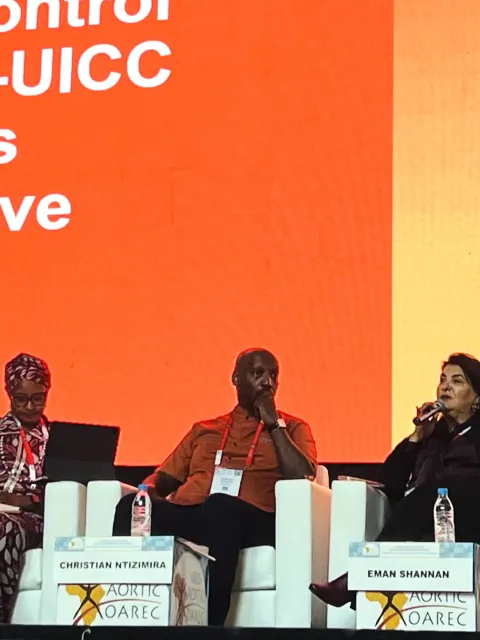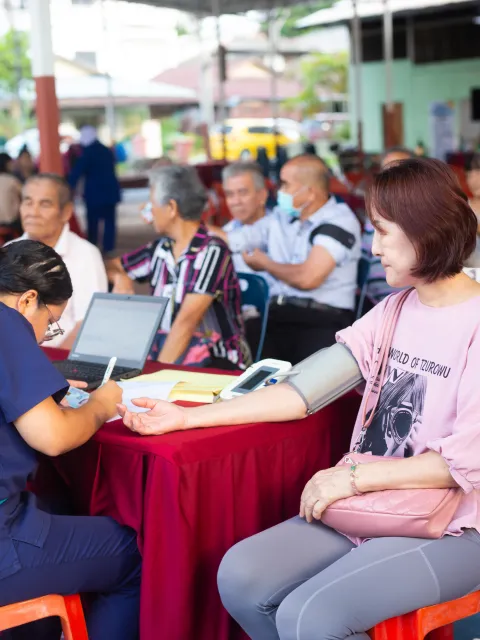New UICC policy brief outlines urgent steps to address AMR in cancer care
A new UICC policy brief highlights urgent reforms to tackle antimicrobial resistance in cancer care, with expert insights from Yehoda Martei and Philip Mathew underscoring deadly delays and systemic shortfalls.

HIGHLIGHTS
- Drug resistance, which makes infections harder to treat, is complicating and delaying cancer treatment and care, with some patients dying from infections rather than the cancer itself.
- UICC's policy brief urges strengthened antimicrobial stewardship, improved diagnostics, and increased access to effective antibiotics and antifungals.
- Dr Yehoda Martei of University of Pennsylvania Perelman School of Medicine, a UICC member, describes critical delays in infection diagnostics and treatment availability in Botswana, often rendering care too late.
- WHO’s Philip Mathew warns of structural gaps in education, funding, and drug supply chains that exacerbate AMR in oncology care.
A new policy brief from UICC outlines priority areas where cancer health professionals and policymakers can focus efforts to address antimicrobial resistance (AMR), cautioning that without timely action, rising antimicrobial resistance or drug resistance could compromise the effectiveness of cancer treatment globally.
Funded by The Trinity Challenge, the brief – Addressing antimicrobial resistance in cancer care: the critical role of the cancer health workforce – emphasises the need to strengthen antimicrobial stewardship, infection prevention and control, and access to effective antibiotics and antifungals, particularly in low- and middle-income countries. It particularly highlights the need for a multidisciplinary approach and the importance of collaboration between infectious diseases and cancer.
AMR occurs when bacteria, viruses, fungi and parasites etc evolve to resist the effects of the medicines designed to kill them, making infections harder to treat. People living with cancer are particularly vulnerable because their weakened immune systems, treatment side effects or complications from treatments, and infections caused by solid tumours, increase susceptibility to drug-resistant infections.
According to the UICC brief, up to 30% of infections in patients with blood cancers are now resistant to commonly used treatments. In India, over 70% of patients with blood cancers were found to carry carbapenem-resistant bacteria, and similar trends have been observed in Uganda.
A recent study published in The Lancet Oncology by the Cancer and AMR Consortium – a collaboration between UICC, BD, and the AMR Action Fund – showed that people with cancer are up to three times more likely to develop drug-resistant infections compared to the general population, even among patients receiving care outside the hospital setting.
To further spotlight these findings and the recommendations in the brief, UICC hosted a side-event on Wednesday 21 May during the World Health Assembly in Geneva, bringing together AMR and NCD experts to explore coordinated responses aligned with the 2024 Political Declaration on AMR.
Dr Yehoda Martei, medical oncologist at the Abramson Cancer Center, University of Pennsylvania Perelman School of Medicine, a UICC member, as well as adjunct lecturer at the University of Botswana and co-author of the Lancet Oncology study, highlighted how AMR has become an unavoidable reality in clinical practice.
“It’s tragic to see patients die with cancer because we have to pause cancer treatment due to widespread infection with multiple resistant organisms that we cannot control,” she said. “In high-income settings, we at least have access to diagnostics and infectious disease expertise. But in places like Botswana and other low-resource settings, the story is very different.”
Dr Martei described how infections in cancer patients, which may begin as manageable complications, can become fatal due to diagnostic delays and unavailability of appropriate treatments. “Blood cultures that should return results in 48 hours can take over a week. By the time we get the data, it’s too late to make informed decisions,” she said. “And even if we know the right medicine to use, it’s not always available, forcing us to rely on broad-spectrum antibiotics that contribute to resistance”.
The number of cancer cases are expected to rise 77 percent by 2050, and this increase will disproportionately affect LMICs, where health systems are often least equipped to respond. In these settings, AMR will compound the burden, undermining infection control and stretching fragile cancer care infrastructure. These systemic gaps are already visible on the ground, as Martei’s experience in Botswana shows.
Dr Philip Mathew, Technical Officer on AMR at WHO, underscored the infrastructure disparities exacerbating AMR’s impact. “The lack of access to both cancer therapies and essential antimicrobials creates a compounded crisis,” he said. “It’s not just about new medicines – it’s about making existing ones reliably available. In many hospitals, even older antibiotics are in short supply or entirely absent due to supply chain breakdowns”.
Dr Mathew explained that while oncologists increasingly recognise the importance of AMR, this awareness is not always mirrored in institutional or national policies. “There is a fair bit of recognition of AMR as a threat, but this is not translating sufficiently into funding for tangible actions, and policy interventions,” he said. “We invest billions in cancer therapeutics, but the pipeline for new antimicrobials remains critically underfunded.”
Dr Martei also reflected on the structural barriers to effective infection prevention and control. “In the US, our oncology infectious disease team specialises in treating cancer patients. But that level of coordination is simply not possible in many parts of the world. You have one infectious disease specialist, if any, and they’re stretched across all departments.”
Dr Mathew underscored the systemic nature of the challenge, noting that medical education often fails to equip future health workers with integrated training on AMR. “We’ve seen siloed curricula where microbiologists, pharmacologists, and clinicians don’t interact. Competency-based, integrated education is urgently needed, especially in developing countries,” he said. WHO is currently developing tools to help countries assess and improve medical training to better prepare health workers for AMR.
The UICC policy brief offers several concrete recommendations for frontline cancer health workers, including integrating WHO antimicrobial stewardship guidance, improving infection prevention and control protocols, and using the AWaRe classification to guide prescribing. It also calls on governments to ensure the sustainable supply of antimicrobials, particularly in oncology settings.
Both experts agreed that storytelling and patient narratives will play a crucial role in shifting policy and public perception. “There’s an emotional disconnect between policy discussions and the real-life impact,” said Dr Mathew. “When you hear from survivors or families who lost loved ones to untreatable infections, the urgency becomes real.”
Last update
Thursday 03 July 2025
